The Information Policy Blog
The (unofficial) blog of the BCLA Information Policy Committee
Category Archives: International Issues
Reactions to the Leaked Trans-Pacific Partnership Document – It’s Pretty Terrible
Posted by on November 14, 2013
A chapter from the Trans Pacific Partnership agreement was leaked this week (thank you WikiLeaks) and the text is as draconian and terrible as we had feared.
From Consumer Affairs:
WikiLeaks published the complete draft of the Intellectual Property chapter for the Trans-Pacific Partnership (TPP), a proposed international commercial pact between the United States and 11 Asian and Latin American countries. Although talks started in 2008, this is the first access the public and press have had to this text. The administration has refused to make draft TPP text public, despite announcing intentions to sign the deal by year’s end. Signatory nations’ laws would be required to conform to TPP terms.
The leak shows the United States seeking to impose the most extreme demands of Big Pharma and Hollywood, Public Citizen said, despite the express and frequently universal opposition of U.S. trade partners.
There are other commentators talking about it very astutely right now, but one of the most important things is how this agreement would make the possibility for change in copyright regimes insanely difficult:
The second that Congress tries to change a law that goes against the TPP — such as, say, reducing the term of copyrights from the insane level today to merely crazy — lobbyists and pundits will come screaming from every direction about how we can’t abandon our “international obligations.” We’ll hear horror stories about how breaking the agreement will have widespread implications, including trade wars, tariffs and other horrible things. Once it’s in the trade agreement, “breaking it” becomes effectively impossible.
The lobbyists for the entertainment industry know this stuff cold. Over the past three decades they’ve perfected this process of getting crap they can’t get done in Congress pushed through in various trade agreements, and then they use that to mold US law to exactly how they want it.
Now that is from a US perspective, but is there any reason to think that Canada would push for fewer restrictions in defiance of a trade agreement like this? Strangely enough, according to Michael Geist’s first reading of the document, there is:
Interestingly, Canada has also promoted Canadian-specific solutions on many issues. The bad news is that the U.S. – often joined by Australia – is demanding that Canada rollback its recent copyright reform legislation with a long list of draconian proposals.
We have our own issues with copyright laws here, but an agreement like this would seem to effectively wipe out any progress we’re making in favour of stricter more punitive laws designed not for and by citizens but corporations.
As we’ve come to expect in this arena, OpenMedia is on the case, providing good calls to action for citizens, though they’re focused on the ISP billing aspect and its anti-consumer implications. The TPP also would turn our Internet Service Providers into copyright police:
Instead of your ISPs selling you a connection service, the TPP will force them to pry into what you’re doing online. The TPP will make ISPs legally responsible if any of their hundreds of thousands of customers downloads illegal content.
A Councillor for the Pirate Party Australia pointed out the punitive nature of aspects of this agreement in a way that could have real implications for libraries:
Perhaps the most shocking inclusion in the TPP IP chapter is criminalisation of non-commercial copyright infringement. Article QQ.H.7.2 contains language that is supported by the United States and by Australia, that would potentially imprison people considered to have committed infringement on a “commercial scale”, regardless of whether there was a financial incentive. This is a fundamentally unbalanced proposal.
Librarians should probably be concerned about that kind of thing. Is the important accessibility work that a Canadian organization like the National Network for Equitable Library Service does on a large enough scale to run afoul of these provisions? Could we be sending anyone who helps break DRM for format shifting purposes to jail? Maybe not, but we are not being given a voice in this debate.
Secret negotiations on issues that affect us, including huge trade agreements, are bullshit. People deserve to have a real voice and make informed choices as to what happens in their lives. Please read up on the TPP (OpenMedia compiled a good bunch of links today) and make yourself heard.
Breaking Cryptography Matters
Posted by on September 8, 2013
This week we learned that Glenn Greenwald was not exaggerating when he said that there was more in Edward Snowden’s leaked info than we had seen thus far. It turns out the NSA (and the GCHQ, its UK equivalent) has been using many methods to attack ubiquitous encryption on the internet:
Those methods include covert measures to ensure NSA control over setting of international encryption standards, the use of supercomputers to break encryption with “brute force”, and – the most closely guarded secret of all – collaboration with technology companies and internet service providers themselves.
Through these covert partnerships, the agencies have inserted secret vulnerabilities – known as backdoors or trapdoors – into commercial encryption software.
This is different from saying that the NSA had cracked everyone’s encryption, but it appears that they’ve been undermining everyone’s privacy and security with the complicity of major technology companies.
This is a big fucking deal.
Part of the reason is because putting in secret vulnerabilities means that dedicated non-governmental agents can find those vulnerabilities and exploit them.
There are ways to protect your security online, but seriously, if the NSA really wanted something about you (and I’m assuming here that most of this blog’s readers are Canadians, thus foreigners to the NSA and fair game for spying on their information conveniently passing through US data-centres) they can get it. From Bruce Schneier:
This kind of thing is done by its TAO – Tailored Access Operations – group. TAO has a menu of exploits it can serve up against your computer – whether you’re running Windows, Mac OS, Linux, iOS, or something else – and a variety of tricks to get them on to your computer. Your anti-virus software won’t detect them, and you’d have trouble finding them even if you knew where to look. These are hacker tools designed by hackers with an essentially unlimited budget. What I took away from reading the Snowden documents was that if the NSA wants in to your computer, it’s in. Period.
In Wired Kim Zetter lays out a bit of the history of this program, called Bullrun:
The ten-year Bullrun program began after the U.S. government failed in its pla to place a backdoor, the so-called Clipper chip, into encryption that would have allowed it to eavesdrop on communications at will. Without the Clipper chip, the government launched a systematic plan using trickery and other methods to circumvent encryption and achieved an unspecified breakthrough in 2010. In the wake of this, according to one document, “vast amounts of encrypted Internet data which have up till now been discarded are now exploitable.”
Some of the methods involved the deployment of custom-built, supercomputers to break codes in addition to collaborating with technology companies at home and abroad to include backdoors in their products. The Snowden documents don’t identify the companies that participated.
Basically, the NSA asks companies to subtly change their products in undetectable ways: making the random number generator less random, leaking the key somehow, adding a common exponent to a public-key exchange protocol, and so on. If the back door is discovered, it’s explained away as a mistake.
We don’t have a secure internet. Major corporations have joined up with security agencies to make it that way.
One thing we can and probably should be doing as information professionals is calling for our libraries and other institutions to be using more Free and Open Source Software. These independent, community-based technologies allow us to see inside the code and make it much more difficult for nefarious shadowy agents (governmental or non-) to add in holes specifically to spy on us and our members we’re providing services to.
I work in a public library in a community that isn’t on the cutting edge of technology. For many of our members I’m the public tech support person, and people ask me about using things like online banking and whether it’s safe to do. It’s important for anyone in this kind of position to know about the tradeoffs being made by technology titans, and how we’re selling our members to companies that, even though the language of the internet is cute (“like” “friend” even “google”), those companies don’t have our members’ best interests at heart.
Schneier suggests techniques like using Tor, and encrypting communications with public-domain encryption that’s cross compatible (this makes it less likely to have been NSA compromised). These won’t keep everything you do secret from a determined, well-funded attacker, but it does make you more expensive to target.
Most members of my library probably don’t need to be paranoid about encryption. They’re looking up recipes and sending messages to their kids and reading romance novels or whatever. But our individual uses of the internet shouldn’t really matter. As Byron Holland says in his post NSA Internet surveillance where’s the outrage?:
It’s not that governments should not have the power to monitor citizens under certain circumstances and with the appropriate oversight – it’s an unfortunate necessity to maintain law and order. But we’re not talking about surveillance with appropriate oversight. We’re talking about an opaque and deliberate system to gather and monitor the activities and communications of potentially everyone who is online.
Why should a government feel it is above judicial oversight to monitor its citizens’ activities, just because they’re online?
Because apparently, we’re fine with it. At the very least, we’re complacent with it.
As information professionals we need to be aware of, and ensure our communities have the chance to be learn about the consequences of these surveillance and broken security technologies. That is our way to help fight complacency.
Organizational Transparency and Closed Doors
Posted by on July 5, 2013
We haven’t been talking about the Library Archives Canada/Canadiana digitization project here on the IPC blog these past few weeks for a couple of reasons. The first is mostly because a lot of the discussion has been taking place on mailing lists I’m not actually on, so whenever I sit down to write I feel a bit like I’m missing some crucial context. But the bigger reason is that other people have been writing very clearly on the matter and I haven’t had anything to add.
I’d suggest that the very best piece of commentary I’ve read has been Mita Williams’ The Heritage Heritage Minute and The Digital Library of Canada We Lost. She goes through the chronology of the situation and provides a very even-handed analysis of why people have concerns about the project. Her essay is peppered with links, including to Kevin Read’s We Ask for Transparency, Heather Morrison’s explanation of why the misuse of Open Access in the leaked documents was problematic, and of course Bibliocracy (I’ll just link to Myron’s most recent post which came after Williams’ was published.
In the face of all that there’s not a lot that I would be adding. But I want to make a comment tying this together with the other big information news of the last month. The American Library Association just had one of their annual conferences and at it they passed a resolution about the NSA spying scandal saying:
that the American Library Association recognize Edward Snowden as a whistleblower who, in releasing information that documents government attacks on privacy, free speech, and freedom of association, has performed a valuable service in launching a national dialogue about transparency, domestic surveillance, and overclassification.
Interestingly, the next day that resolution was “replaced” by this resolution in which Snowden’s name was removed and the language was changed to reflect a more general support for “privacy, open government, government transparency and accountability.” In a letter to the Social Responsibilities Round Table Al Kagan said:
As progressive councilors have discussed for the past two years, it is all fine and good to support the results of whistleblowing, but this does not happen without the brave action of individuals. Whistleblowers put their jobs, their careers,their freedom, and sometimes their lives in danger by taking bold measures to bring abuse of the public trust to the media. Nothing happens without the individuals, and they need all the support that they can get.
He also called for librarians to be braver and lead discussion, rather than simply accepting backroom deals.
Libraries in general could benefit from a more open discussion of how our organizations work, especially when some members have issues with the results. Being quiet and unquestioning doesn’t help anyone improve.
access, surveillance & edward snowden
Posted by on June 9, 2013
As it stands right now, there are three biggish stories going on in the information policy world right now. As is usual with the IPC, access to information is our unifying thread.
First the World Intellectual Property Organization’s treaty that wants to ensure print-disabled citizens can’t have access to materials for them. That’s going on right now. In Canada library organizations are urging Canada’s negotiating team to argue for certain positions:
- That authorized agencies have the right to bypass a technological protection measure to make alternate format available to another authorized agency or qualified individual worldwide.
- That the treaty not include a “commercially available” restriction on the cross border supply of alternate formats. This would have the effect of placing cumbersome, if not unworkable, requirements authorized entities and severely impede the availability of content to all, especially in underdeveloped and developing countries.
- That cumbersome and unnecessary treaty language referencing other legislative (US fair use) or treaty (Berne’s 3 step test) regimes is unnecessary.
CULC’s full letter is available here. One of the issues with these treaties and negotiations has to do with our old friend Digital Rights Management (or TPM in Canada) and how the language of these agreements (and Canadian laws) are set up to benefit well-resourced lobbying groups even while there’s some reasonable lip-service paid. So this is an issue.
There’s also rumbling about Library and Archives Canada putting up paywalls on digitized materials. This one doesn’t have anything official out there yet, so we’ll just link to some preparatory ire.
And then thirdly there’s the big American news about the NSA keeping databases of phone calls and the program PRISM that gives the NSA access to internet companies’ information and just today Edward Snowden came forward as the leaker of that NSA information.
There’s a lot out there on these things to read. David Simon (of The Wire fame) wrote about how this PRISM thing isn’t a scandal because this is how the law works. Warrants are still necessary, and do you really want to take these tools out of law enforcement’s hands?
Frankly, I’m a bit amazed that the NSA and FBI have their shit together enough to be consistently doing what they should be doing with the vast big-data stream of electronic communication. For us, now — years into this war-footing and this legal dynamic — to loudly proclaim our indignation at the maintenance of an essential and comprehensive investigative database while at the same time insisting on a proactive response to the inevitable attempts at terrorism is as childish as it is obtuse. We want cake, we want to eat it, and we want to stay skinny and never puke up a thing. Of course we do.
Others are talking about what shoddy journalism these leaked stories are since all the tech companies are denying that they’re participating. And there’s some indication that all these companies are doing is just making the NSA’s job easier within the bounds of the law.
I have some sympathy with David Simon (and John Scalzi, for that matter) when they say that this whole thing is just how the world works and pretending to be surprised now is bullshit. Money and Power and all that. These are the laws we made to create a legal surveillance state. But that doesn’t make it right. (It’s also impossible to feel any sympathy for (and infuriating to see) a government who is trying to make itself out as the gut-wrenched victim though.)
There’ll be more coming. But one of the things to be aware of here is that even though it’s possible the only person who did anything illegal in regards to this whole NSA program is Edward Snowden for leaking it (and it is very interesting that Hong Kong is where he’s hoping to avoid being extradited; the Chinese probably have more clout on that than they were portrayed as in The Dark Knight) that’s a huge problem. We wouldn’t be able to talk about what these surveillance laws hath wrought if someone hadn’t snuck them out. This just highlights the importance of challenging and changing laws to fit the needs of citizens instead of law-enforcement and spy agencies.
Of course, it is possible to talk about these policies even without a scandal of illegality. Michael Geist has a great post (filled with links and analysis) talking about how the issues raised by PRISM apply in Canada:
Does this mean Canadian authorities are engaged in similar forms of surveillance? That phone companies such as Bell and Telus are subject to warrants similar to those faced by Verizon? That Internet companies co-operate with Canadian authorities? That Canadian and U.S. authorities share information obtained through programs such as the Verizon meta-data program or PRISM? That Canadians are targeted by the U.S. programs?
The law would suggest that all of these things are entirely possible. Given the integrated communications networks and the increased information sharing, it seems very likely. Yet since virtually everything remain shrouded in secrecy, Canadians don’t know for sure.
That “shrouded in secrecy” is the problem in all three of these issues we’re talking about today. As information professionals we need to push for more transparency in our laws. We also need to be working with organizations pushing for more privacy for individuals and more openness for governments (and other powerful organizations). This is one of those times we need to be supporting OpenMedia and the Electronic Frontier Foundation.
Last word for today comes from Edward Snowden:
The primary lesson from this experience was that “you can’t wait around for someone else to act. I had been looking for leaders, but I realised that leadership is about being the first to act.”
What do you think we should do?
CBSA’s Quarterly List of Admissible and Prohibited Titles (July to September 2012)
Posted by on March 18, 2013
The Canadian Border Services Agency (CBSA) publishes a quarterly list of controversial titles that have been admitted and titles that have been prohibited from entering Canada. Below, please find screenshots of the list for the period July to September 2012. If you’d like to receive the list directly, you can subscribe at http://cbsa.gc.ca/alert-avis/piu-uip-eng.html
BCLA Press Release on Dale Askey / McMaster / Edwin Mellen Lawsuit
Posted by on February 14, 2013
Press Release For Immediate Release 13.02.2013
The British Columbia Library Association (BCLA) is extremely concerned about the unwarranted and frivolous lawsuits that Edwin Mellen Press has filed against Associate University Librarian Dale Askey and against McMaster University.
Edwin Mellen Press alleges that that comments made by Mr. Askey on his personal blog regarding the quality of their publications were defamatory, and are seeking a total of $4.5 million dollars in damages to compensate for injury to their reputation.
As a professional librarian engaged in collection development Mr. Askey is both qualified and obliged to make decisions about published materials. Central to this issue is Mr. Askey’s academic freedom which should ensure that he, as well as fellow academic librarians, has the ability to freely speak, write, review and evaluate as professionals without fear of reprisal, litigation, or control by vendors, employers or other external bodies.
As a citizen in a democratic society Mr. Askey is free to have and share his opinions with his community, society and country. Sharing and debating perspectives without fear of recrimination is the hallmark of a healthy democratic society peopled by engaged citizens.
Librarians and information workers uphold the rights of all community members to express a critical view about the value of a book or other information materials. This includes a librarian’s own right to do the same. Every citizen should be able to express an opinion without fear of litigation should they offend an author or publisher. By filing lawsuits against Mr. Askey and McMaster University Edwin Mellen Press is attempting to create a climate of fear among librarians, information workers, and all libraries that may critique their product.
BCLA condemns the misuse of the court process to intimidate libraries, librarians and information workers from discharging their professional obligations and from demonstrating one of the library’s core responsibilities to uphold the right of freedom of thought and expression.
BCLA urges Edwin Mellen Press to withdraw its lawsuits and instead engage in a debate, a conversation or a discussion with the library community in order to build a healthy society that reflects a myriad of opinions held by diverse community members.
CBSA’s Quarterly List of Admissible and Prohibited Titles (April to June 2012)
Posted by on January 21, 2013
The Canadian Border Services Agency (CBSA) publishes a quarterly list of controversial titles that have been admitted and titles that have been prohibited from entering Canada. Below, please find screenshots of the list for the period April to June 2012. If you’d like to receive the list directly, you can subscribe at http://cbsa.gc.ca/alert-avis/piu-uip-eng.html
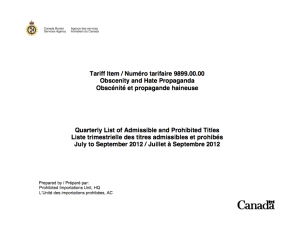
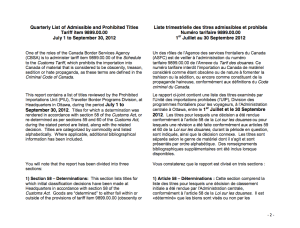
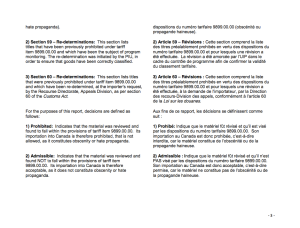
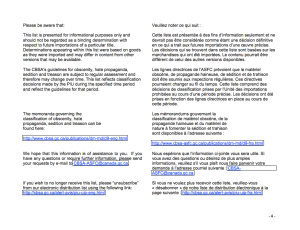
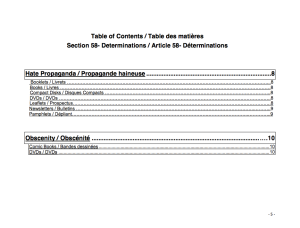
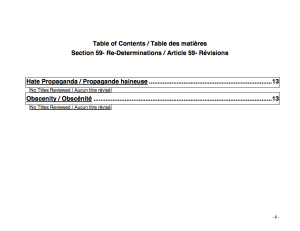
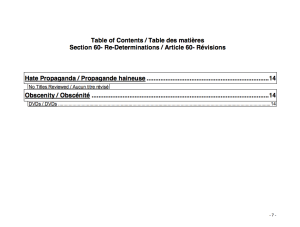
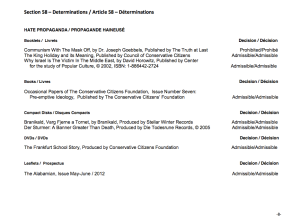
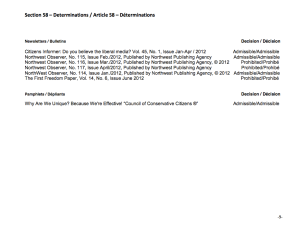
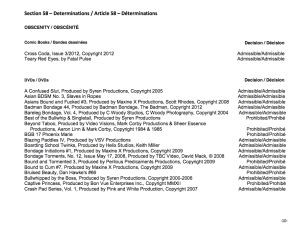
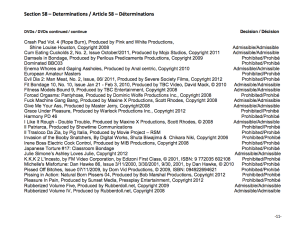
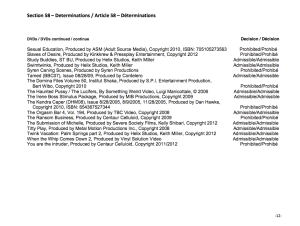
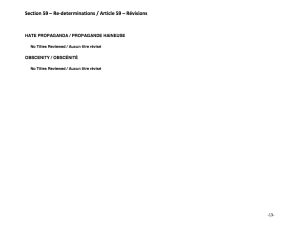
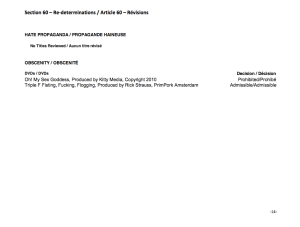
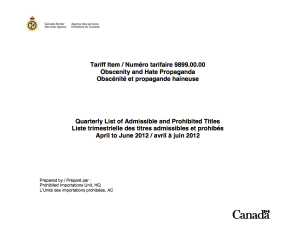
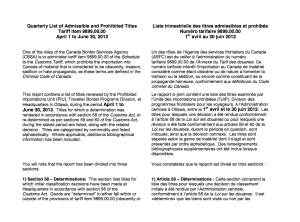
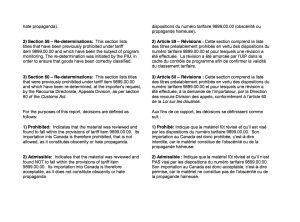
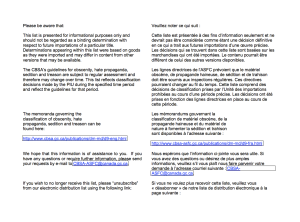
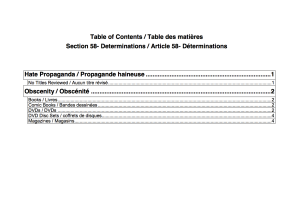
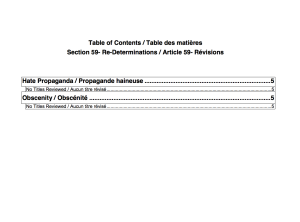
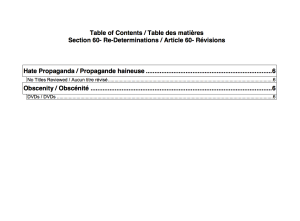
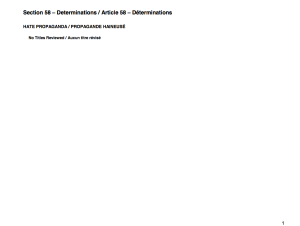
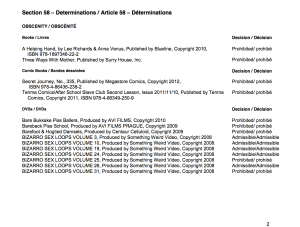
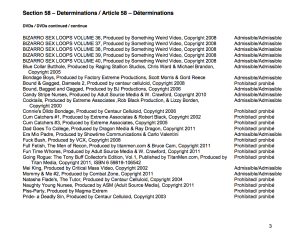
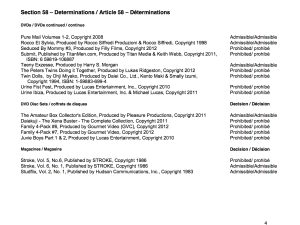
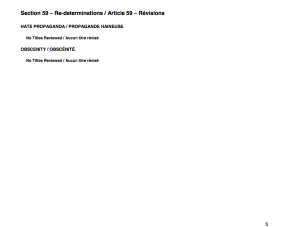
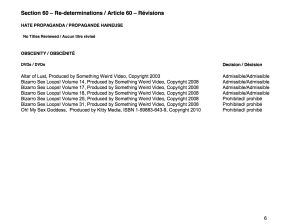

Fresh (Possibly Bizarre) Activity in Mellen Press vs Dale Askey lawsuit situation
Not content with suing librarian Dale Askey for his opinion (see BCLA’s statement on the issue), Edwin Mellen Press is sending its lawyers out (or at least letters from the lawyers) to get blog posts critical of its operations taken down. The Scholarly Kitchen has the letter here.
What did those posts say? According to the letter they attacked the character of the publisher. As Gary Price from the Infodocket points out in his article on the subject, it’s actually hard to remove something from the internet, so let’s see those posts again (thanks for the links). From the first of the taken down posts (via the Internet Wayback Machine, which has prompted at least one tweeter to speculate if Archive.org will be the next entity sued by EMP):
And from the other post:
Also interesting, apparently whoever’s registered the domain name daleaskey.net uses a mellenpress.com email address. The registrar for daleaskey.com is emp@mellen.demon.co.uk. Daleaskey.org has the most tenuous connection to EMP, only sharing the hosting company with the registrar for daleaskey.net. Admittedly this could all be nothing, and I’m sure a lawyer-friendly organization like EMP wouldn’t create a Fake Dale Askey online presence. But still. It’s kind of bizarre. [UPDATE: @DaveYP has a spreadsheet of EMP’s domain holdings if you’re interested in digging in further.]